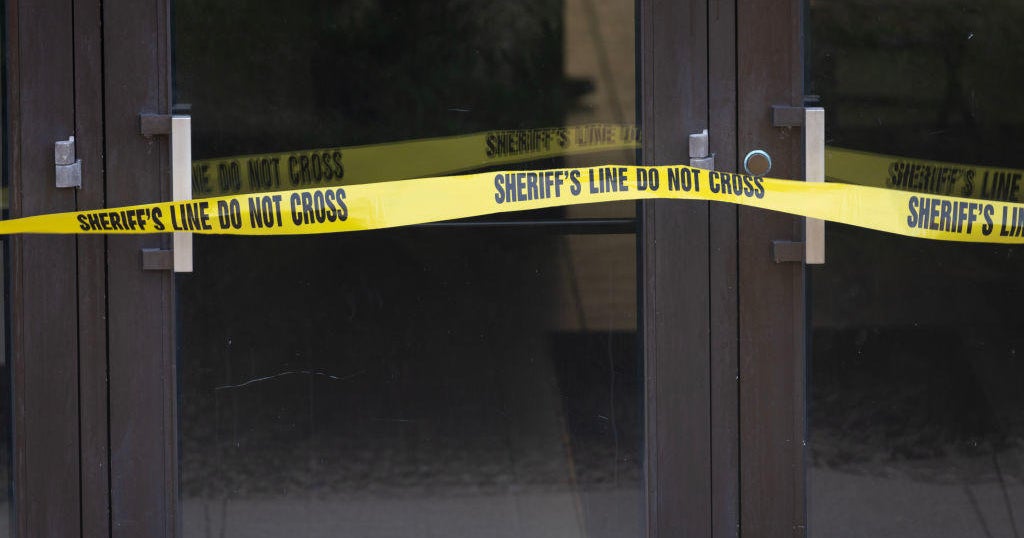CBS News
LSU student arrested over alleged death threat vs. governor who wanted live tiger at game

Baton Rouge, La. — An LSU student has been arrested after, prosecutors say, he made an online threat to kill Louisiana Gov. Jeff Landry, who advocated for bringing a live tiger onto the field as part of a recent college football game.
Landry, a Republican, helped revive the school’s tradition of wheeling a caged Bengal tiger into the stadium before kickoff for the first time in nearly a decade. Animal rights activists protested outside the stadium.
Gerald Herbert / AP
An arrest affidavit says Jackson Pemberton, 21, told state police investigators on Tuesday that he was joking when he posted on social media “I am going to kill you jefflandry,” tagging the governor’s account on X, media outlets reported.
Pemberton told investigators he was “upset with the governor’s decision regarding the live tiger that was brought on the LSU football field this previous weekend,” the affidavit said.
Gerald Herbert / AP
Pemberton, of Baton Rouge, was booked into the East Baton Rouge Parish prison on a count of threatening a public official, media outlets reported. Jail records didn’t indicate whether he has an attorney or if bond had been set.
In a statement Wednesday, an LSU spokesperson said the university was aware of the student’s arrest.
“We take any behavior that threatens the safety of individuals or our community very seriously,” the statement reads. “LSU is committed to a respectful, responsible, and safe environment for all.”
CBS News
12/18: CBS Evening News – CBS News

Watch CBS News
Be the first to know
Get browser notifications for breaking news, live events, and exclusive reporting.
CBS News
Wisconsin school shooter was in contact with California man plotting his own attack, court documents say

The shooter who killed a student and teacher at a religious school in Wisconsin brought two guns to the school and was in contact with a man in California whom authorities say was planning to attack a government building, according to authorities and court documents that became public Wednesday.
Police were still investigating why the 15-year-old student at Abundant Life Christian School in Madison shot and killed a fellow student and teacher on Monday before shooting herself, Madison Police Chief Shon Barnes told the Associated Press Wednesday. Two other students who were shot remained in critical condition on Wednesday.
A Southern California judge issued a restraining order Tuesday under California’s gun red flag law against a 20-year-old Carlsbad man. The order requires the man to turn his guns and ammunition into police within 48 hours unless an officer asks for them sooner because he poses an immediate danger to himself and others.
Carlsbad is located just north of San Diego.
According to the order, the man told FBI agents that he had been messaging Natalie Rupnow, the Wisconsin shooter, about attacking a government building with a gun and explosives. The order doesn’t say what building he had targeted or when he planned to launch his attack. It also doesn’t detail his interactions with Rupnow except to state that the man was plotting a mass shooting with her.
CBS’ San Diego affiliate KFMB-TV reported that law enforcement searched the man’s home Tuesday night after the order was signed by the judge.
Police, with the assistance of the FBI, were scouring online records and other resources and speaking with the shooter’s parents and classmates in an attempt to determine a motive for the shooting, Barnes told the AP.
Police don’t know if anyone was targeted in the attack or if the attack had been planned in advance, the chief said. Police said the shooting occurred in a classroom where a study hall was taking place involving students from several grades.
“I do not know if if she planned it that day or if she planned it a week prior,” Barnes said. “To me, bringing a gun to school to hurt people is planning. And so we don’t know what the premeditation is.”
On a Madison city website providing details about the shooting, police disclosed Wednesday that two guns were found at the school, but only one was used in the shooting. A law enforcement source previously told CBS News the weapon used appears to have been a 9 mm pistol.
Barnes told the AP that he did not know how the suspected shooter obtained the guns and he declined to say who purchased them, citing the ongoing investigation.
No decisions have been made about whether Rupnow’s parents might be charged in relation to the shooting, but they have been cooperating, Barnes told the AP.
Abundant Life is a nondenominational Christian school that offers prekindergarten classes through high school. About 420 students attend the institution.
The Dan County Medical Examiner’s Office identified the two people killed Wednesday as 42-year-old Erin West and 14-year-old Rubi Vergara.
An online obituary on a local funeral site stated Vergara was a freshman who leaves behind her parents, one brother, and a large extended family. It described her as “an avid reader” who “loved art, singing and playing keyboard in the family worship band.”
West’s exact position with the school was unclear.
CBS News
12/18: The Daily Report – CBS News

Watch CBS News
Be the first to know
Get browser notifications for breaking news, live events, and exclusive reporting.







